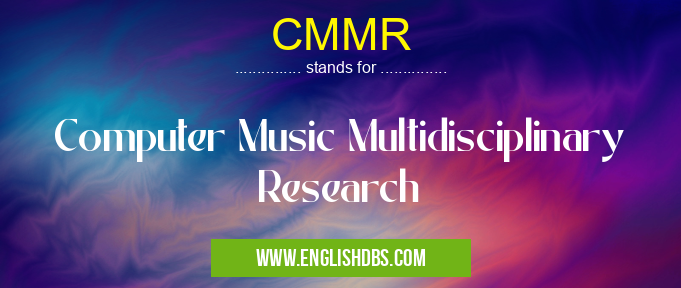What does CMMR mean in COMPUTING
Computer Music Multidisciplinary Research (CMMR) is a field of study that explores the intersection between music, computer science, and other areas of research such as neuroscience, machine learning, and artificial intelligence. CMMR seeks to understand how technology can be used to create and produce music; how humans interact with computers in their music-making activities; and the potential implications this may hold for the future of music composition, performance and consumption.

CMMR meaning in Computing in Computing
CMMR mostly used in an acronym Computing in Category Computing that means Computer Music Multidisciplinary Research
Shorthand: CMMR,
Full Form: Computer Music Multidisciplinary Research
For more information of "Computer Music Multidisciplinary Research", see the section below.
What is CMMR
CMMR is an interdisciplinary field dedicated to exploring the relationship between technology and music. It focuses on understanding how humans interact with computers when it comes to making music, as well as exploring new ways of using technology to create soundscapes or musical compositions. From neuroscience investigations into how different sounds affect our brainwaves, to algorithms that can generate an infinite number of musical pieces based on a few parameters - CMMR looks at both existing technologies and forward-looking possibilities.
Essential Questions and Answers on Computer Music Multidisciplinary Research in "COMPUTING»COMPUTING"
What is Computer Music Multidisciplinary Research (CMMR)?
CMMR is an interdisciplinary research field which combines elements of computer music, sound engineering, audio processing and digital signal processing to contribute new knowledge and insight. It seeks to develop methods, algorithms and software tools to help advance the understanding of the relationships between sound, music and technology.
What type of research topics are covered by CMMR?
CMMR covers both theoretical and practical topics related to computer music such as audio synthesis, digital signal processing, musical acoustics, psychoacoustics, interactive systems and applications for live performance. Additionally, it investigates innovative interaction techniques for musical instruments and studies emerging technologies for sound production.
Who does CMMR benefit?
CMMR contributes to the development of music-making technologies in a wide range of fields including the recording industry, live performance venues, acoustic engineering and education. By providing insights into the multi-dimensional aspects of music synthesis and composition, musicians can gain a deeper understanding of sound production with examples from every genre.
What advances has been made in CMMR?
Recent advancements in CMMR include novel approaches in areas such as adaptive systems for interactive performances, gesture recognition interfaces for controlling external devices and artificial intelligence based applications that can generate new styles or sounds on the fly. Additionally there have been several software architecture-based contributions which have enabled distributed computing environments to produce complex pieces of art or music across multiple devices simultaneously.
How are algorithms used in CMMR?
Algorithms play a crucial role in computer music by providing efficient synthesizing processes that mimic certain characteristics or behaviors found naturally in traditional instruments or voices. Algorithms also enable autonomous sound generation by extracting relevant attributes from available data sets or from user input parameters like tempo, tonality etc., allowing for more complex compositions that can be modified quickly according to context conditions or preferences.
How does Digital Signal Processing fit into CMMR?
Digital Signal Processing (DSP) is an important technique used by researchers within this field for manipulating audio signals with mathematical calculations that distort their original content beyond recognition but still retain their essential characteristics — thus enabling them to sound more natural when heard through loudspeakers instead of headphones or earphones. DSP also helps manage dynamic range compression, so sounds on any given device remain audible despite variations in volume levels usually associated with playback devices such as multimedia players or tablets.
Are other scientific disciplines incorporated into this research area?
Yes! As well as disciplines related to technical aspects such as signal processing theory and software design practices; other scientific fields such as psychology and linguistics are also included due to the need for introducing concepts like semiotics into model-based approaches towards creating more meaningful performances where emotions take center stage over technicalities alone.
What kind of practical applications exist within this research area?
Through accelerating techniques using graphical processors (GPUs )and running models over data sets spanning multiple domains such as food engineering practices or genetics; some results within this domain could go on towards helping improve medical diagnostics accuracy rates - by providing hitherto unavailable information concerning human perception regarding certain stimuli that could affect doctors' judgments.
Is it possible to use machine learning algorithms within this field?
Absolutely! Machine Learning approaches offer opportunities toward automatic selection processes concerning musical works' interpretation given certain contexts — thereby significantly reducing time lost while deciding ‘which song should we play next' decisions at crowded concert venues.
Final Words:
Computer Music Multidisciplinary Research will revolutionize the way we think about creating and experiencing music. By bringing together experts from multiples disciplines like computer science, psychology, engineering and others - CMMR will continue to open up new opportunities for musicians all over the world. From virtual reality instrument creation through machine learning-generated soundscapes - the future of music looks bright indeed!
